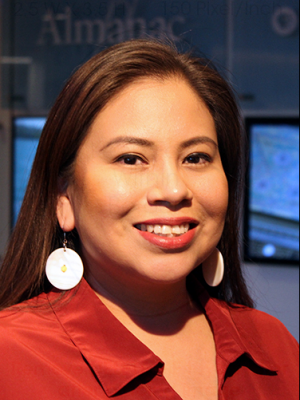PARK CITY, Utah—The Sundance Institute announced today that director and producer Leya Hale is the 2020 recipient of the Sundance Institute Merata Mita Fellowship, an annual fellowship named in honor of the late Māori filmmaker Merata Mita (1942-2010).

The announcement was delivered at the 2020 Sundance Film Festival by N. Bird Runningwater, director of the Sundance Institute’s Indigenous Program. Runningwater praised Hale, while offering up memories on the fellowship’s namesake, Mita (Ngāi Te Rangi/Ngāti Pikiao), who was New Zealand’s first Indigenous female filmmaker. Mita also served as an advisor and artistic director of the Sundance Institute Native Lab from 2000 to 2009, where she championed emerging Indigenous talent.
“This annual fellowship celebrates the enormous artistic contributions and memory of our beloved colleague and friend Merata Mita, who was a mother, an activist, documentarian and the first Indigenous woman to write and direct a dramatic feature film,” Runningwater said.
“Further, it underlines Sundance Institute’s ongoing global commitment to supporting Indigenous artists,” he added. “The selection of Leya Hale as the 2020 recipient reflects the incomparable talent, productivity and lifelong creative and artistic energy in everything that Merata accomplished throughout her life.”
Hale, who comes from the Sisseton Wahpeton Dakota and Diné Nations, lives in Saint Paul, Minn. with her companion and three children. Along with her film projects, she is also an award-winning producer for Twin Cities PBS.
According to Sundance, Hale was selected from a global pool of applicants and will be awarded cash grants and a yearlong continuum of support. The support includes a trip to the Sundance Film Festival, access to strategic and creative services offered by Sundance Institute’s myriad artist programs and mentorship opportunities.
Hale’s is best known for her directorial debut, Reclaiming Sacred Tobacco. The film won the 2017 Upper Midwest Emmy Award for Best Topical Documentary. Her most recent documentary, The People’s Protectors, received a 2019 Upper Midwest Emmy Award for Best Cultural Documentary.
Her history with Sundance dates back a few years. She is one of four 2017 Sundance Film Institute Knight Fellows, a 2019 Sundance Film Institute Creative Producing Fellow and a 2018 Big Sky Film Institute Native Initiative Fellow.
Founded in 1981 by Robert Redford, Sundance Institute is a nonprofit organization that “provides and preserves the space for artists in film, theatre, and media to create and thrive,” according to its website. The Institute's signature labs, granting, and mentorship programs, dedicated to developing new work, take place throughout the year in the U.S. and internationally.
For more information, visit sundance.org/programs/indigenous-program.
More Stories Like This
Zuni Youth Enrichment Project Takes Top Emerging Artist Apprentices to Phoenix for Artistic Exploration and Cultural ImmersionFrom Dishwasher to Award-Winning Chef: Laguna Pueblo's Josh Aragon Serves Up Albuquerque's Best Green Chile Stew
Rob Reiner's Final Work as Producer Appears to Address MMIP Crisis
Vision Maker Media Honors MacDonald Siblings With 2025 Frank Blythe Award
First Tribally Owned Gallery in Tulsa Debuts ‘Mvskokvlke: Road of Strength’
Help us defend tribal sovereignty.
At Native News Online, our mission is rooted in telling the stories that strengthen sovereignty and uplift Indigenous voices — not just at year’s end, but every single day.
Because of your generosity last year, we were able to keep our reporters on the ground in tribal communities, at national gatherings and in the halls of Congress — covering the issues that matter most to Indian Country: sovereignty, culture, education, health and economic opportunity.
That support sustained us through a tough year in 2025. Now, as we look to the year ahead, we need your help right now to ensure warrior journalism remains strong — reporting that defends tribal sovereignty, amplifies Native truth, and holds power accountable.
 The stakes couldn't be higher. Your support keeps Native voices heard, Native stories told and Native sovereignty defended.
The stakes couldn't be higher. Your support keeps Native voices heard, Native stories told and Native sovereignty defended.
Stand with Warrior Journalism today.
Levi Rickert (Potawatomi), Editor & Publisher
